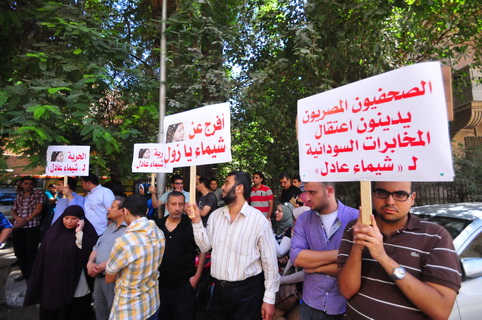Last month I watched Hamada Helal warbling in “Helm El-Omr (Dream of a Lifetime) – in which Ezzat Abu Ouf played a slightly nasty cigar-smoking man called Roshdy Beik.
This week, I watched Mohamed Saad comedy vehicle “Boshkash – in which Abu Ouf played a very nasty cigar-smoking man called, wait for it, Roshdy Beik.
Has a law at some point been passed saying that all new Egyptian cinema productions must cast either Abu Ouf or Hassan Hosni? Is it like the new traffic law? Is Abu Ouf a mandatory reflective triangle? If he’s not on the cast list, will the producers be given a fine?
There he was yet again, Abu Ouf, the Morgan Freeman of Egyptian cinema, and this time just to make it even harder for us to distinguish his character from the role he played in the last film, both have the same name.
Roshdy Beik part 1 was identical to Roshdy Beik part 2 to such an extent that watching him reprise the role yet again was a bit like when I had a job stuffing flyers in magazines for eight hours a day, and hours merge into days, and days merge into weeks, and weeks merge into death, essentially.
Time seemed to stand still as I sat in that dark room while around me children screeched in an assortment of Gulf dialects and Abu Ouf is Roshdy Beik and Roshdy Beik is every summer season Egyptian film you’ve ever seen in your life.
So, as has been established in mind-numbing detail, Abu Ouf is the villain.
His bumbling nemesis is Boshkash Mahfouz, played by Saad, who is ebullient as usual.
Boshkash is a failed goalkeeper turned extremely successful football agent. He attributes this success to a necklace given to him by a sorcerer in a God-awful scene which regurgitates hackneyed, colonialist stereotypes about heathen black Africa and its tribal dancing, witch-doctoring ways.
The necklace remains firmly tied around Boshkash’s neck until he loses it during a brawl at a party when his luck immediately vanishes.
It is picked up by Zeina, a TV presenter who has a bee in her bonnet about Boshkash’s boss, none other than Roshdy Beik, a businessman who she publicly accuses of opening up hospitals with fatally-negligent standards of care.
As you would expect, the purpose of virtually all of the characters is to act as fall-guys for Saad, whose overpowering presence dominates every scene – which is lucky given that lead actress Zeina rehashes her usual offering of supposedly spiky cutesiness, being slightly irritating in the process.
I am not entirely sure why Zeina keeps being cast in these light comedy roles, but it must have something to do with her enormous talent.
Boshkash – while slightly more articulate – is essentially a variation on Saad’s alter ego El Limby, another Sobky Productions creation.
Like Jim Carey, Saad’s brand of comedy is reliant on his ability to do extraordinary things with his body: he demonstrates an impressive ability to contort his slightly oddly-proportioned body into the most grotesque shapes, thanks mostly to his distended stomach and posterior.
Fans of 1990s British comedy will be reminded of Vic Reeves, one half of the legendary Reeves and Mortimer duo who was similarly gifted in the physical contortions department.
Occasionally funny but always frenetic, Saad misses the mark in Boshkash mostly because of the script.
The plot is just not absurd enough to be truly funny, with the result that while Saad’s chaos does shine in a few of the scenes, he is ultimately bogged down by a feeble storyline and the incongruous moral sermon – apparently obligatory in all Sobky films – in the final scene.
A crazy flight of fancy in one scene shows us what might have been if Saad had been released from the pen of dull production and a conformist script.
Ultimately, the star of the show for me was Edward, who puts in an unexpectedly hilarious cameo appearance and will be given a lead comedy role immediately if there is any justice in the world.

